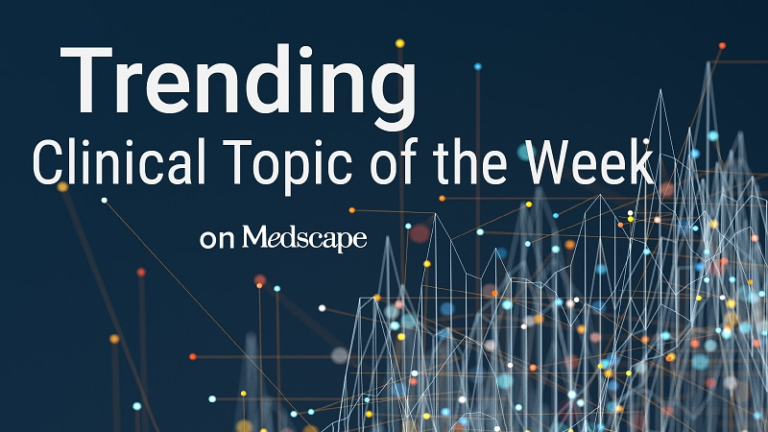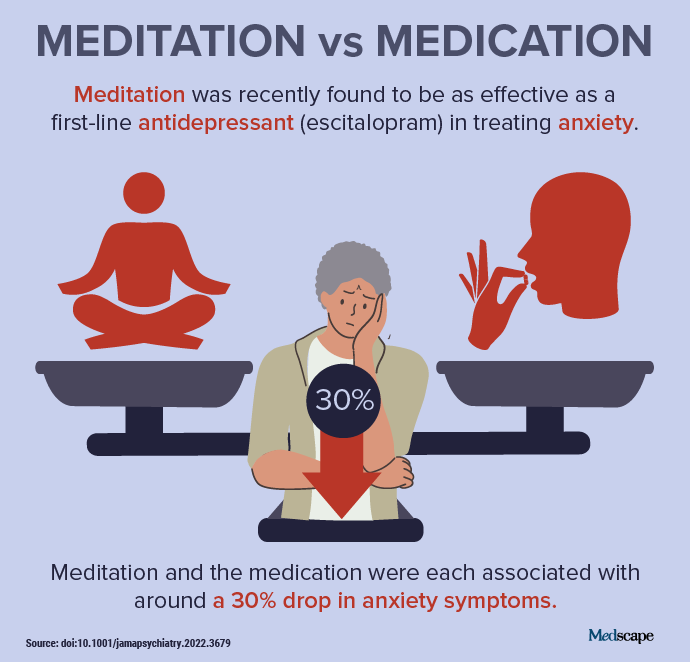Each week, we identify a top search term, speculate on the causes of its popularity, and provide an infographic on a related condition. If you have any thoughts on what’s trending and why, share them with us on Twitter Or Facebook.
Evidence demonstrating the potential of meditation to produce significant health outcomes continues to accumulate. Several recent studies have compared the effectiveness of mindfulness and related strategies versus pharmaceutical interventions in various conditions. The results generated a lot of interest, perhaps particularly from a trial of mindfulness-based stress reduction (MBSR) in patients suffering from anxiety disorders (see infographic).
The study included 276 adult patients, most of whom suffered from generalized anxiety or social anxiety. The average age was 33; 75% were female, 59% were white, 15% were black and 20% were Asian. Participants were randomly assigned to receive MBSR (136 patients) or escitalopram (140 patients). MBSR included a weekly 2.5-hour class, a full-day weekend class, and daily 45-minute guided meditation sessions at home. The primary outcome was the Clinical Global Impression–Severity (CGI-S) scale score for anxiety. Among the 208 participants who completed the study, the average baseline CGI-S score was 4.44 for MBSR and 4.51 for escitalopram. At week 8, the MBSR group’s score improved by an average of 1.35 points, while the escitalopram group’s score improved by 1.43 points (difference, -0.07; 95% CI , -0.38 to 0.23; P = 0.65). The lower end of the CI (-0.38) was below the pre-specified non-inferiority margin of -0.495, indicating non-inferiority. Approximately 78% of patients receiving escitalopram experienced at least one treatment-related adverse event, compared to 15.4% in the MBSR group.
Another recent study examined the effect of mind-body practices, including yoga and meditation, on patients with type 2 diabetes. The meta-analysis included 28 studies involving patients with type 2 diabetes and published between 1993 and 2022. The results suggested that mindfulness modalities improved glycemic control to a similar extent as medications such as metformin. Across all types of mindfulness interventions, a significant average reduction in HbA1c of 0.84% was observed (P < 0.0001). With MBSR, HbA1c was reduced by 0.48% (P = 0.03). With meditation in particular, HbA1c fell by 0.50% (P = 0.64). The largest decrease in HbA1c was associated with yoga, where it decreased by 1.00% (P < 0.0001); this is roughly the same degree of glycemic control achieved with metformin, the authors suggest.
MBSR has also recently proven effectiveness against pain. In a randomized trial, more than 100 healthy people were assigned to an 8-week MBSR program, an 8-week health enhancement program (HEP), or a waitlist. To examine the effect of interventions on the experience of pain, participants underwent a painful task. They underwent 20 thermal stimuli applied to the wrist for 12 seconds, including 8 seconds at maximum temperature. During the task, participants underwent MRI to assess the neurological pain signature (NPS) and stimulus intensity-independent pain signature-1 (SIIPS-1) in the brain. The MBSR group had a significant decrease in NPS compared to the HEP group (P = 0.05) and pre-to post-intervention assessments (P = 0.023). Members of the MBSR group also experienced “marginal” decreases in NPS compared to the waitlist group (P = 0.096) and in the SIIPS-1 compared to the HEP (P = 0.089) and groups on the waiting list (P = 0.087). In subjective pain ratings, the MBSR group had a slight decrease compared to the waitlist group (P = 0.078) and assessments before and after the intervention (P = 0.028). Long-term meditators reported significantly less pain intensity and discomfort (P < 0.001).
From pain to blood sugar control to anxiety disorders, the potential for meditation and related interventions to produce results similar to those of pharmaceutical interventions has certainly captured the attention of many clinicians. These three recent findings in particular were of interest to those comparing meditation to medications, leading to this week’s top trending clinical topic.
Take a quick quiz on the main recent discoveries related to anxiety.

